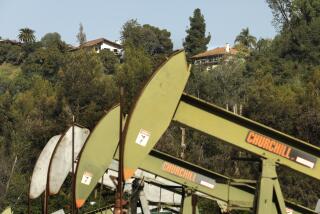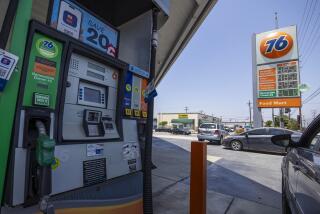Not the usual drill
LIFTING THE 25-YEAR-OLD BAN on new offshore drilling for natural gas is a bad enough idea on its own. But a proposal scheduled to be debated Thursday by the House is as devious as it is dreadful. Because natural gas is rarely found by itself -- it’s usually found in the same place as oil -- the provision could increase the possibility of oil drilling off California and other coastal states.
But the first point against this proposal is that it’s simply unnecessary. About 75% of estimated offshore gas reserves are in areas where drilling already is allowed, mostly in the Gulf of Mexico and off Alaska. Nearly 4,000 gas leases in the Gulf of Mexico remain unused.
Even so, the energy industry wants to expand operations along the coasts, and it has found a friend in Rep. John E. Peterson (R-Pa.), who inserted an amendment in the Interior Department appropriations bill that would allow gas exploration in federally controlled waters three miles from shore. That’s not a happy prospect for California’s tourism industry; gas rigs would be visible from the beach, not to mention the pipelines and other industrial infrastructure onshore. And though drilling for gas doesn’t carry the same potential for environmental catastrophe as drilling for oil, it produces significant water and air pollution. Yet the gain in energy resources would be minimal.
Just last year, the energy industry was making many of its opponents’ arguments. Arguing for the right to drill for oil as well as gas, the industry said that companies would be unwilling to invest the money in exploration for gas alone because no one can know in advance whether a site will yield gas, oil or both. In fact, Johnnie Burton, director of the Interior Department’s Minerals Management Service, expressed doubts about whether drilling for gas alone could succeed. “Natural gas seldom comes totally by itself,” he said, noting that it is usually accompanied by oil. If oil is found with the gas, he asked, “What do you do? Do you plug it?”
Good question. The industry naturally will press to pump it, and with the economics of oil being what they are -- and likely to remain -- someone will. But then the U.S. would have the offshore oil drilling that caused environmental disasters such as the 1969 Santa Barbara spill from an offshore oil platform. Or the ruptured pipelines and oil structures damaged by Hurricane Katrina last year, spilling 191,000 barrels of oil into the Gulf of Mexico.
The House is scheduled to consider a new amendment that would restore the drilling moratorium, nullifying the Peterson amendment. It would halt, for a while, one more damaging proposal by lawmakers who appear to favor the short-term interests of the industry over the long-term interests of the nation.
More to Read
Sign up for Essential California
The most important California stories and recommendations in your inbox every morning.
You may occasionally receive promotional content from the Los Angeles Times.










